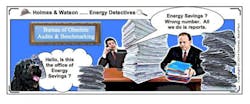Is energy auditing and benchmarking a billion dollar industry?
Watson: I have some questions for you Holmes.
- How much money is spent in the U.S. every year training and certifying Energy Auditors and Benchmarkers?
- How much money is spent every year on Energy Audits and Benchmarking?
- How many people are employed by DOE, EPA, State Energy Agencies and Utility Companies administering Energy Audit and Benchmarking programs?
Probably most important question I have is, How much Energy and Money do Energy Audits and Benchmarking save every year?
Holmes: Quite frankly Watson, I doubt if anyone alive can answer your first three questions. All I know is that there are hundreds of millions if not billions of dollars spent every year on these programs with tens or hundreds of thousands of people employed.
I can answer your last question with 100% confidence – Energy Audits and Benchmarking save zero, zilch, zip, nil, nought, nothing. They are nothing more than Paperwork Exercises all Preparing to Save Energy.

